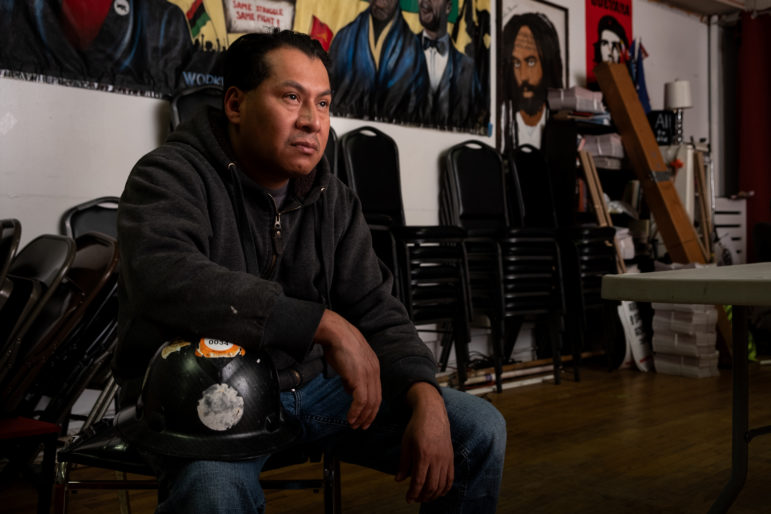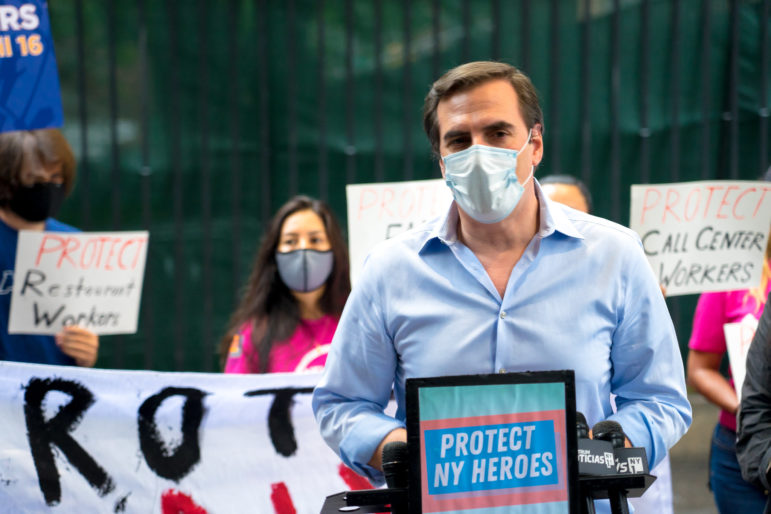Under the NY HERO Act, workers can request the creation of a workplace safety committee to assess the effectiveness of security protocols and raise health concerns, among other tasks. But so far, workers have little recourse when employers fail to comply. An amendment to the law awaiting the governor’s signature would create stricter penalties for noncompliance.

Adi Talwar
Cesario Espildora, 45, is one of several demolition workers organizing to improve conditions, but say their petition under a new state law to start a workplace safety committee has been ignored by management.Lea la versión en español aquí.
As soon as Best Super Cleaning workers arrived at a demolition site in New York, one of the first things they started doing was looking for basics: a broom, buckets and plastic bags to move debris, pieces of solid columns that can be used as a battering ram to knock down drywall; and when the height of the location required it, ropes that could serve as harnesses or lifelines.
The demolition company they work for did not provide them with such tools for years, workers claim. “It’s embarrassing to admit it,” said one former employee who didn’t want to be identified by name for fear of jeopardizing ongoing disability claims with the company, “but we had to steal brooms from buildings because we didn’t have tools.”
For several months these workers, many of whom say they’ve suffered work-related injuries or accidents, have been organizing and protesting, demanding increased wages, paid sick days, and the rehiring of workers who say they lost their jobs after demonstrating. Their efforts brought some progress: since Oct. 27, the company started to provide workers with tools like gloves, masks, brooms, dustpans, shovels, drills, power saws, ladders, extension cords, harnesses, and lifelines. But the company hasn’t met their other demands, according to workers.
So they’re now looking to take advantage of new protections created by The New York Health and Essential Rights Act (NY HERO Act), passed by state lawmakers last year to provide additional workplace safety protections in response to the COVID-19 pandemic. The law also allows employers with more than 10 workers to form Workplace Safety Committees, made up of both employees and employer representatives, that would assess the effectiveness of security protocols, raise health and safety concerns, review workplace occupational safety policies and reports filed by the employer, among other tasks.
On Oct. 24, Best Super Cleaning workers filed a workplace safety committee request. However, company management has so far failed to respond, and the workers now fear that, with no response time explicitly defined in the regulation, the company may dilute their demands.
“We always provide the tools,” a Best Super Cleaning representative who answered the phone managed to say, before hanging up. Additional attempts to reach the company for comment were unsuccessful.
Establishing and administering a workplace safety committee does not require any kind of notice to the New York State Department of Labor (DOL), so there is no information on how many committees have been formed so far since the law was passed, a DOL spokesperson explained.
A rule proposed in the State Register late last year says employers should respond with “reasonable promptness” to workers’ requests to form a safety committee. An amendment to the legislation passed last spring, and which supporters are hoping Gov. Kathy Hochul will sign into law before the end of the year, would go further by requiring employers to respond specifically to petitions within five days.
Toothless enforcement
Workers in various industries statewide have run into similar issues in trying to from committees under the new law, explained Liam Lynch, safety and health specialist at New York Committee for Occupational Safety and Health (NYCOSH). “This law is in its infancy, is very new,” he said. “The lack of data [on the committees] really speaks of the lack of enforcement.”
At NYCOSH alone, Lynch said they have seen at least 10 cases where the HERO Act is not being followed as it should be, adding that there are still many workers who don’t even know they have these rights.
“Last spring, we heard about similar issues from workers at Dotdash Meredith and Chipotle, where management had failed to respond or even retaliated against workers who filed requests for NY HERO worker committees,” Maritza Silva-Farrell, executive director of the Alliance for a Greater New York (ALIGN), said. “When workers brought their complaints to the Department of Labor, no action against the employer was taken.”
When they noticed these problems, advocates of the NY Essential Workers Coalition proposed an amendment to the law (S.9450/A.10492), to strengthen the DOL’s ability to levy penalties against companies that fail to comply. It also specifies that an employer must recognize the establishment of a workplace safety committee within five days of its formation, and can be fined $50 a day until that happens.
With the amendment, which lawmakers passed last June, the DOL can investigate and if an employer is not in compliance with the worker committee, then the commissioner can assess a civil penalty or appropriate relief for violations. “Our biggest concern is ensuring workers have recourse when employers violate workers’ right to form workplace safety committees,” Silva-Farrell said.
When asked about the HERO Act committees’ issue and its subsequent amendment, Senate Deputy Leader Michael Gianaris, who was behind both pieces of legislation, said that “the state’s bureaucracy has failed too many employees who have been unable to avail themselves of rights guaranteed to them under the HERO Act.”
“In fact,” he added, “we were forced to pass additional legislation to further clarify to appropriate agencies that it is their job to enforce this law and bring employers into compliance or face the consequences.”

Flickr/ Senator Michael Gianaris
State Sen. Michael Gianaris at a rally for the HERO Act in 2020. He’s now pushing for Gov. Hochul to sign an amendment into law that would increase enforcement for employers who fail to comply.Senate Labor Committee Chair Senator Jessica Ramos pointed out other problems that made it difficult for the law to have enforcement teeth within the DOL—namely, staffing levels. “The sticking points workers are experiencing in their attempts to exercise the NY HERO Act are the consequences of our former governor’s decision to implement a hiring freeze at the Department of Labor,” Ramos said, referring to then-Gov. Andrew Cuomo’s decision to suspend new state employee hires at the start of the pandemic (Gov. Kathy Hochul lifted the freeze last year).
Payroll records maintained by the Empire Center for Public Policy via its SeeThroughNY database show 5,811 employees at the DOL in 2021, up from 5,318 in 2020.
“Unfortunately,” she added, “the DOL is still trying to dig their way out of the rush of demand that hit them during the pandemic. Seeing how we can bolster their ability to enforce laws and proactively defend workers has to be a priority next session.”
The amendment was introduced during the last legislative session and passed both legislative chambers in June, though it has not yet been signed into law by the Gov. Hochul—one of several hundred bills still awaiting her signature before the calendar year comes to an end. “I hope Governor Hochul signs it soon,” Gianaris said, noting that the bill has not been delivered to the governor for approval or veto.
A spokesperson for the governor said Hochul is reviewing the legislation, one of several hundred bills still awaiting her signature before the calendar year comes to an end.
“This amendment will prevent companies like Meredith Corp, Chipotle, and Best Super Cleaning from retaliating against workers who care about safety on the job, and ensure that the state has enforcement power to make NY HERO safety committees a powerful reality,” Silva-Farrell stated. “Governor Hochul can hold these companies accountable now by taking swift action to sign the NY HERO amendment into law.”
Meanwhile, workers continue to wait. If an employee deems the employer’s response to a request for a workplace safety committee as not within a reasonable timeframe, the employee can submit a complaint to the NYSDOL.). “The DOL would investigate if an employer did not permit the establishment of a committee and a complaint was filed,” a DOL spokesperson said.
Local law also overlooked
The demolition workers’ demands are not only falling through the cracks of the unclear state labor law, but the company has also failed to comply with a new local law. Last year, the New York City Council passed Intro 2318, which requires all construction labor providers (also known as “body shops” that supply temporary workers to third-party clients for non-union construction work or manual labor) to get a license from the Department of Consumer and Worker Protections (DCWP) to operate in the city, but Best Super Cleaning hasn’t obtained one, according to the agency.
“We are investigating Best Super Cleaning LLC, however we are unable to comment on pending investigations,” said Michael Lanza, DCWP’s spokesman.
The local law also requires employers to notify employees of their rights, certifications necessary to perform the job, equipment needed for the assignment, wages, and benefits. Best Super Cleaning workers say they have not received such information despite performing high-risk work.
“As people say, I am a cat,” worker Cesario Espildora, 45, explains, referring to the belief that cats have seven lives (or nine, depending on which version of the adage you subscribe to). “I have had four accidents, three more or less serious.”
One of them occurred during the summer of 2020, in the Bronx. “We were bagging dry cement,” Espildora said in Spanish. “They [workers] packed a lot of cement in the bags and we had no equipment to break it up, so the bags were extra heavy. There was a wooden ladder and we made a chain to pull the bags down.”
Espildora remembers being in the basement, near the end of the human chain of workers passing bags of cement from hand to hand from top to bottom. “I was grabbing a bag, standing upright, and suddenly a piece of cement fell on my helmet. And I fell to the ground.”
One of the bags had broken and a piece of cement had fallen and hit him. He was taken to the hospital but they found nothing wrong with him, though he says he was in pain. The next day, he went to work to support himself and his family amid the pandemic, even though he still felt pain in his neck. Injuries from that accident, coupled with a fall from a truck to the ground, have kept him visiting different physiotherapists, Espildora said.
According to NY’s Occupational Safety and Health Administration (OSHA), Best Super Cleaning has been inspected seven times since 2017: four were planned by OSHA targeting the type of work being done at the site; two were based on referrals; one was a follow-up to an earlier inspection. Two inspections are currently open and not yet completed, and two others resulted in citations and penalties for violations.
The OSHA office did not provide further details on the two inspections that are currently open but reminded employees that they have the right to file a confidential complaint with the agency to have their workplace inspected.
“Written complaints (or filed online) that are signed by workers or their representative and submitted to an OSHA area or regional office are more likely to result in on-site OSHA inspections,” a regional OSHA spokesperson explained.








